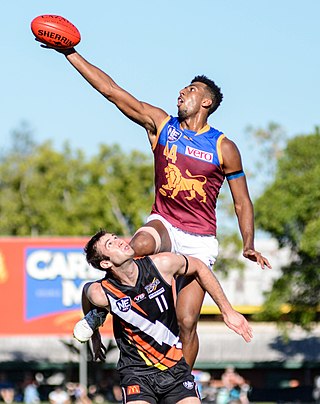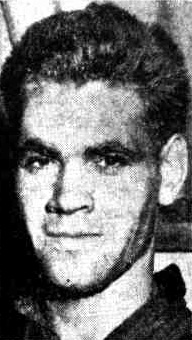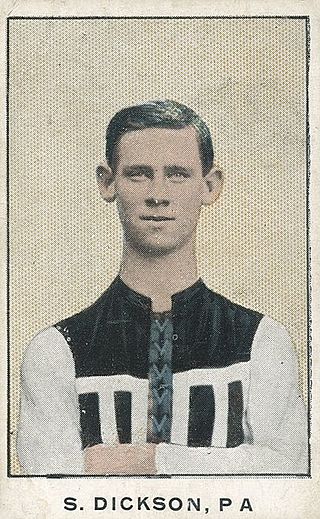Related Research Articles

Australian rules football, also called Australian football or Aussie rules, or more simply football or footy, is a contact sport played between two teams of 18 players on an oval field, often a modified cricket ground. Points are scored by kicking the oval ball between the central goal posts, or between a central and outer post.

The Charles Brownlow Trophy, better known as the Brownlow Medal, is awarded to the fairest and best player in the Australian Football League (AFL) during the home-and-away season, as determined by votes cast by the four officiating field umpires after each game. It is the most prestigious award for individual players in the AFL. It is also widely acknowledged as the highest individual honour in the sport of Australian rules football.

Graham Vivian "Polly" Farmer was an Australian rules footballer who played for the Geelong Football Club in the Victorian Football League (VFL) and the East Perth Football Club and West Perth Football Club in the Western Australian National Football League (WANFL). He is regarded as one of the greatest players of all time.
Gregory Donald Williams is a former Australian rules footballer who represented Geelong, the Sydney Swans and Carlton in the Australian Football League (AFL) during the 1980s and 1990s. A midfielder, he is a dual Brownlow Medal winner and at his peak was the then-highest-paid player in the history of the sport, including an under-the-table $200,000 bonus payment. He was also linked to further controversy during the 1990s.

John Noel William "Sam" Newman is a former Australian rules footballer who played for the Geelong Football Club in the Victorian Football League (VFL).

Byron Pickett is a former professional Australian rules footballer who played for the North Melbourne Football Club, Port Adelaide Football Club and Melbourne Football Club in the Australian Football League (AFL). He was known as a big game player as well as for his strength, hard bumps and tough approach to the game. Pickett is one of 12 players with two premiership medallions, a Norm Smith Medal and over 200 AFL games. In 2005 Pickett was acknowledged as one of the finest Aboriginal players in the history of the game, with his selection to the Indigenous Team of the Century. He announced his retirement from AFL at the end of the 2007 season.

Shaun Playford Burgoyne is a former Australian rules footballer who played for the Port Adelaide Football Club and Hawthorn Football Club in the Australian Football League (AFL).

AFL South Africa is the governing body and federation for Australian rules football in South Africa. Its name is due to its formal affiliation in 2004 to the AFL Commission the game's world governing body.

The Australian Football League (AFL) is the pre-eminent and only fully professional competition of Australian rules football. It was originally named the Victorian Football League (VFL) and was founded in 1896 as a breakaway competition from the Victorian Football Association (VFA), with its inaugural season in 1897. It changed its name to Australian Football League in 1990 after expanding its competition to other Australian states in the 1980s. The AFL publishes its Laws of Australian football, which are used, with variations, by other Australian football organisations.

Jordan Scott Bannister is a former Australian rules football player and umpire, who played for Carlton and Essendon and umpired in the Australian Football League.
The 1985 VFL season was the 89th season of the Victorian Football League (VFL), the highest level senior Australian rules football competition in Victoria.
Jeff Gieschen is the former National Umpire Manager of the Australian Football League (AFL) and a former Australian rules football player and coach who played in the Victorian Football League (VFL) between 1974 and 1978 for the Footscray Football Club. He was the senior coach of AFL club Richmond from late 1997 until the end of the 1999 season.
The 1981 VFL season was the 85th season of the Victorian Football League (VFL), the highest level senior Australian rules football competition in Victoria. The season featured twelve clubs, ran from 28 March until 26 September, and comprised a 22-game home-and-away season followed by a finals series featuring the top five clubs.
The 1967 VFL Grand Final was an Australian rules football game contested between the Richmond Football Club and Geelong Football Club at the Melbourne Cricket Ground on 23 September 1967. It was the 70th annual grand final of the Victorian Football League, staged to determine the premiers for the 1967 VFL season. The match, attended by 109,396 spectators, was won by Richmond by a margin of nine points, marking the club's sixth VFL premiership and their first since 1943.
Glenn Robert JamesOAM is a former Australian rules football umpire in the Victorian Football League. James umpired the 1982 and 1984 VFL Grand Finals and is recognised as the only Indigenous Australian to umpire VFL or AFL football.
The Aboriginal and Islander Sports Hall of Fame was established in 1994 to recognise Indigenous Australians that have achieved at the highest level of their chosen sport. It was a joint project of the Aboriginal and Torres Strait Islander Commission (ATSIC) and Macquarie University, under the management of Colin Tatz. Inductees are sometimes referred to as "Black Diamonds", being the name of the first book of the project, published in 1996.

AFL Women's (AFLW) is Australia's national semi-professional Australian rules football league for female players. The first season of the league in February and March 2017 had eight teams; the league expanded to 10 teams in the 2019 season, 14 teams in 2020 and 18 teams in 2022. The league is run by the Australian Football League (AFL) and is contested by each of the clubs from that competition. The reigning premiers are Brisbane.

The 2017 AFL Grand Final was an Australian rules football game contested between the Adelaide Football Club and the Richmond Football Club at the Melbourne Cricket Ground on 30 September 2017. It was the 122nd annual grand final of the Australian Football League staged to determine the premiers for the 2017 AFL season. The match, attended by 100,021 spectators, was won by Richmond by a margin of 48 points, marking the club's eleventh VFL/AFL premiership and first since 1980. Richmond's Dustin Martin was awarded the Norm Smith Medal as the best player on the ground.

An Australian rules football card is a type of trading card relating to Australian rules football, usually printed on cardboard, silk, or plastic. These cards feature one or more Australian rules football players. Cards are almost exclusively found in Australia as no top-level leagues are present outside the country. Prices for Australian rules football cards can be very high. This is illustrated for both vintage and modern cards such as an 1894 American Tobacco Company card featuring Essendon player Will Crebbin which sold for $10,110 in 2018 and a 2004 Select AFL Conquest Triple Brownlow Medallist signature card featuring Nathan Buckley, Adam Goodes and Mark Ricciuto which was valued at $3,000 in 2018.

Albert "Pompey" Austin was an Australian athlete, tracker, entertainer and sportsman. Austin is recognised as the first Indigenous Australian to play senior Australian rules football in Victoria, when he played a single game for the Geelong Football Club in 1872.
References
- ↑ Farmer captain of top indigenous team (1 August 2005)
- ↑ Gordon, Michael (2 August 2005) The PM, footy and symbolic reconciliation
- ↑ "Albert "Pompey" Austin is acknowledged as being the first indigenous Australian to play in an organised Australian Rules football game", which he did when he played for Geelong in a match against Carlton on 25 May 1872 (Dickman, Sharron, "The tale of 'Pompey' Austin", Geelong Cats, 28 May 2014) — the match report is at Football: Geelong v. Carlton, The Geelong Advertiser, (Monday, 27 May 1872), p.3. For more about Austin, see Hay, Roy, "Albert ‘Pompey’ Austin, 1846?–1889: A Man between Two Worlds", Sports & Editorial Services Australia, 26 January 2017.
- ↑ Timms, Aaron (2 August 2005) Honours for O'Loughlin, Goodes give the Swans timely boost
- ↑ Team for the Ages
- ↑ Full Points Footy listing of All Star Teams Archived 2009-04-28 at the Wayback Machine
- ↑ Wilson, Ray (3 July 2009) Bulldogs Top of the Talent Tree Archived 29 April 2009 at the Wayback Machine
- ↑ Heming, Wayne (9 August 2008) Indigenous NRL team named